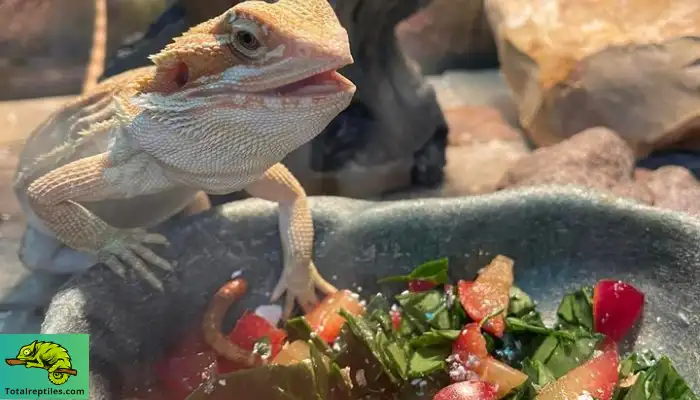Unfortunately, that citric acid-packed fruit isn’t good for dragons.
As a fellow beardie owner myself, I know how important it is to feed them a balanced diet so they stay healthy and happy. But if your bearded dragon eyes that bright yellow lemon on the counter, should you give them a slice? It’s a common question many owners have. Still, lemons may seem like a great snack.
In this article, I’ll give you the lowdown on whether bearded dragons can eat lemons safely. We’ll go down into the science-backed nutrition facts about why you should avoid offering lemon bearded dragons. So grab some crickets for your scaly sidekick, and let’s start!

Are Lemons Toxic to Bearded Dragons?
Lemons are rich in citric and oxalic acids. That’s what gives them the sour taste that puckers your lips.
Unfortunately for our bearded dragon buddies, having an acidic is no fun. The high acid content can irritate a dragon’s mouth and cause gastrointestinal issues if they eat more than just a bite.
You see, bearded dragons have a very delicate digestive system. Too much acidity throws off their gut pH balance and can prevent proper absorption of nutrients.
Over time, this can lead to nutritional deficiencies and dehydration. It’s not worth the risks, even if they look cute nibbling on a lemon slice.
Now, a tiny taste of lemon probably won’t cause significant problems. But lemons should never be part of your dragon’s diet plan.
So, while a teensy taste of lemon probably won’t harm your bearded dragon too much, it’s best to avoid these sour fruits altogether.
Health Risks of Feeding Lemons
What exactly can go wrong if our scaly pals eat these sour fruits? Lemons, unfortunately, come with a list of potential issues for beardies:
- Digestive Upset – That tart citric acid can cause stomach aches, vomiting, diarrhea, and other troubles.
- Mouth Sores – Direct contact with lemon juice can irritate the tissue in a dragon’s mouth, leading to painful canker sores or ulcers.
- Metabolic Bone Disease – The acidity negatively affects calcium absorption, which can eventually cause this detrimental bone condition.
- Obesity – Lemons have high natural sugar. Too much can cause weight gain, fatty liver, and other issues.
- Dehydration – High water and acidity cause fluid loss and electrolyte imbalances.
- Nutritional Deficiency – Acidity interferes with nutrient absorption, depriving your beardie of vital vitamins and minerals.
- Skin Irritation – Your dragon’s sensitive skin may become irritated if they get lemon juice on their face or body.
As you can see, feeding lemon bearded dragon has many risks ranging from mild to severe. It’s not worth endangering your pet’s health for a bit of citrusy flavor.
Here are a few scary scenarios that can result from too much lemon:
- Chronic gastrointestinal disease
- Painful mouth injuries
- Brittle and deformed bones
- Liver and kidney failure
- Lethargy and weakness
- Loss of appetite, malnutrition
Safe Alternatives to Lemons
We’ve established that lemons are a no-go for bearded buds. But what fruits CAN we offer for a tasty treat? Fortunately, there are lots of refreshing options that are dragon-approved!
Here are some of the best low-acid fruits to provide variety and enrichment:

- Apples – A classic choice that’s loaded with vitamins. Just remove the seeds first.
- Berries – Blueberries, raspberries, and blackberries offer antioxidants.
- Mangos – Great source of vitamin A plus sweet flavor.
- Melons – Watermelon, cantaloupe, honeydew. Pick seedless varieties.
- Papaya – Loaded with digestive enzymes.
- Peaches – Remove the pit first for a juicy, calcium-rich snack.
- Figs – Offer fresh or dried for a chewy treat.
- Bananas – Top source of potassium, but serve occasionally due to sugar content.
When selecting fruits, I always look for options with an ideal calcium-phosphorus ratio like the ones listed above. This helps prevent metabolic bone disease.
Here are a few tips on providing fruits safely:
- Wash thoroughly and remove seeds, pits, peels
- Chop into bite-sized pieces
- Offer only occasionally, as fruits are sugary treats
- Introduce new items slowly in case of sensitivity
- Monitor poops for any changes indicating upset digestion
While lemons are off the table, you’ve still got a ton of variety to keep your bearded dragon happy, healthy, and well-nourished! Just stick to low-acid choices in moderation.
What To Do If Your Bearded Dragon Eats Lemons
Uh oh, did your sneaky lil’ buddy manage to swipe a lemon slice when you weren’t looking? It happens to all pet owners. Don’t panic! Just monitor them and take measures.
- Monitor for lethargy, loss of appetite, or other odd behaviors. Contact the exotics vet if anything seems off.
- Avoid inducing vomiting at home – this can be dangerous. Let the vet handle it.
- Provide extra hydration by gently syringing water or an oral electrolyte solution.
- Feed their regular greens, veggies, and insects diet to get nutrition back on track.
Most of the time, a small taste of lemon won’t cause long-term issues for a bearded dragon. But the risks of digestive upset are still there, so staying careful is important.
FAQ
1. Can bearded dragons eat lemon juice?
No, lemon juice is not appropriate for bearded dragons. The juice form contains very concentrated citric acid, much higher than what’s found naturally in the lemon flesh. Consuming straight lemon juice poses a major risk of mouth and digestive irritation for bearded dragons.
2. Are other citrus fruits like oranges bad for bearded dragons?
Yes, all citrus fruits should be avoided when feeding bearded dragons. Oranges, grapefruits, limes, and other citrus contain the same high levels of citric acid that bother their sensitive digestive systems. They offer no substantial nutritional benefits over safer fruits anyway.
3. Can bearded dragons eat lemon balm?
Yes, bearded dragons can eat lemon balm. Moderately feeding lemon balm is safe and non-toxic. You should grow it yourself to ensure it’s organic and pesticide-free.
4. can bearded dragons eat lemongrass?
Lemongrass can be fed to bearded dragons in moderation as part of a varied diet. It boosts dragon health with fiber, vitamins, antioxidants, and antibacterial and anti-inflammatory qualities. It is recommended to keep it raw; they would eat their greens raw in the wild.
Conclusion
lemons are just too acidic and risky to feed bearded dragons purposefully. While a taste here and there likely won’t cause major issues, avoiding these citrusy fruits is best.
There are so many better, safer options to give your dragon variety! Fruits like blueberries, mangos, and figs make awesome low-acid treats. And don’t forget nutrient-packed veggies, greens, and insects to form the basis of their diet.
The bottom line – skip the lemons! With all we know about bearded dragon nutrition and the risks of citric acid, there’s simply no good reason to mess with these sour fruits.

